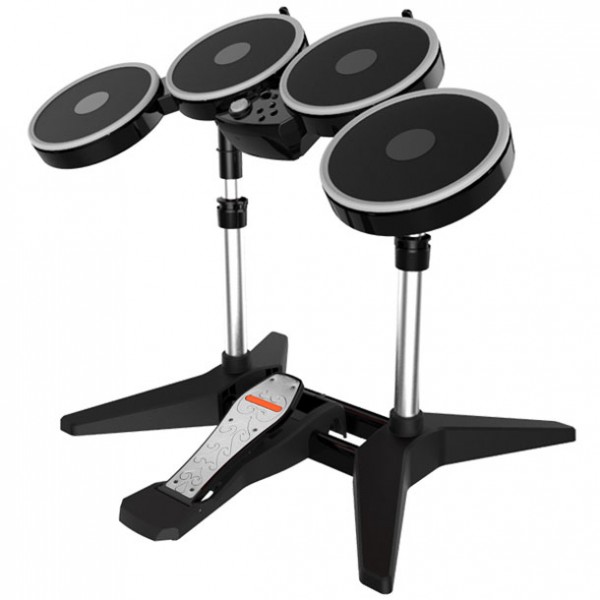Please support Game Informer. Print magazine subscriptions are less than $2 per issue
Rock Band 4 Is Coming – Here’s What You Need To Know

The Rock Band series went dark in April 2013, when Don McLean’s “American Pie” was released as a farewell track. Fans continued to play the music game at parties and with friends and families, but it looked like we’d seen the last of it. In January 2015, Harmonix released new DLC songs, seemingly out of nowhere. Additional songs, coupled with a recent survey, provided strong hints that something was brewing for the series. Today, Harmonix made it official and announced Rock Band 4 for Xbox One and PlayStation 4 is coming in 2015.
“There was a period of fairly deep introspection, where we felt like the time was right, but we really wanted to make sure that we had a creative vision that we could rally around, that we felt would be sort of worth doing this again,” project manager Daniel Sussman told me in a pre-announcement interview. “From a creative standpoint, we didn’t just want to port Rock Band 3; that would not be the most interesting thing for us to do, as a bunch of creative developer people, but also just in terms of bringing this thing back. We felt like it needed to innovate in a couple of key ways that would change the conversation around what a music game could be.”
During the course of our conversation, he provided some tantalizing details about the project. While the team is saving a lot of content for an E3 reveal, Sussman did give me answers to some high-level questions. If you’re a Rock Band fan, you’ll definitely want to keep reading. Here’s what you need to know about Rock Band 4.
Your songs are safe
Staying current with Rock Band was a potentially costly endeavor. Over the course of the series, thousands of tracks hit the marketplace. With each one costing a buck or two, you can see how building up a library of songs could add up. Even though the series is making a technological leap, longtime fans don’t have to worry about facing a double-dipping situation.
“We’re putting a lot of effort into rebuilding that DLC library on the current-gen consoles, and that’s a pretty big initiative in and of itself,” Sussman says. “It took us five-plus years to accumulate a library that has thousands of songs in it. It’s a time-consuming process for us and the first parties; lucky for us we have great relationships there and they understand the value of that library in the context of Rock Band. If you bought songs in Rock Band 3 or Rock Band 2 or Rock Band 1, songs that you bought will carry forward to Rock Band 4. There are a lot of folks out there who have spent some significant scratch on the DLC catalog and the last thing we want to do is come back to those players and say, ‘OK, you have to buy those songs again.’ We’ll support entitlements, we’ll have the full library out.”
…And so are your instruments (fingers crossed)
The second big question players are likely to ask is whether they’ll have to buy new instruments, or if the ones from last-gen will work. “We’re working with Sony and Microsoft to make that possible, and I have to hedge a little bit because the keys to that kingdom really are held by the first parties,” Sussman says. “We’re dealing with a lot of hardware technology that has changed over the generational gap, and the security protocols and the chips in play are different on 360 and Xbox One, and to some lesser extent, between the PS3 and the PS4. But there’s still policy and some challenging technology that we’re working through. But those conversations are going very well, and I’m confident that we will have a solution, but because we don’t have it today that’s kind of the most concrete statement that I can make about it.”

New peripherals are coming
“At the same time, for the folks who have never played the game before or for whatever reason decide they want to get rid of their old guitars and drums, Mad Catz is working on a set of hardware that is native to this new generation of console, and it’ll be A-list quality, wireless controllers,” Sussman says. “We’re keeping the general form factor and function in line with what we have done before, so you will see a replica Strat and the classic drum, and that’s largely in part to our commitment to supporting legacy hardware. We don’t want to upsell the new hardware from a gameplay standpoint . That said, there are a lot of opportunities for incremental improvements at the component level and general build quality.”
Keyboards are out
You may have noticed that Mad Catz is making guitar and drum peripherals, with no mention of the keyboard, which was introduced with Rock Band 3. “We’re focusing on the core band. There’s a lot of back-to-roots Rock Band 1,” Sussman says. “From a hardware perspective, we really want to rally around the classic configuration of guitar, bass, vocals, and drums, and double down on a feature set that will appeal to that player – because that’s where the action is. Those are the peripherals that most people have.”
Harmonix is planting a stake with Rock Band 4
Don’t let that number fool you – Harmonix has a long-term plan for Rock Band 4. “There are a lot of things that I think we can do, both on the publishing side and the development side, to sustain Rock Band 4 as a product,” Sussman says. “Rock Band 4 is a sequel relative to Rock Band 3 and that 4 is really an indication of our commitment to innovation in this space and the idea that this is a bona fide evolutionary step from Rock Band 3 in a lot of ways. It does not imply that there will be a Rock Band 5, 6, 7, and 8. We think that there’s an opportunity this time around, given the technology to interact directly with our audience and also to react to the feedback that we get directly from our audience to sort of expand upon a core game of Rock Band 4. So Rock Band 4 will expand through title updates, through content updates, over the long span. We view Rock Band 4 as the Rock Band for this console generation, and it will continually evolve through a dialogue with our community. I think Rock Band is a great title to utilize that approach in the console space.”
You’re in a band, act like it
Harmonix always wanted to give players a chance to experience the joy that comes with making music. Sussman says that by taking a fresh look at their series, they realized there was work to do. “There is a certain dynamic [playing in a real band] that you feel that’s magical when you are playing with people who are in tune with what you’re doing and are paying attention to you and are reacting to you in cool ways. It’s one of the best things about playing music with people, and it’s an element of our band sim that I think is lacking.
"When you watch people play the game, you kind of have four people staring at their little track, completely oblivious to everything that’s going on around them until you get to the results screen and you go, ‘OK, I got this percentage.’ There are some dynamics in that moment that I think are entertaining, but what could we do from a game-design standpoint to allow you to pick your head up above the fray and reward you for paying attention for what other people in your band are doing. That ended up being a pretty rich trove of great ideas, a lot of which we prototyped, and some of which we’re building. It had an immediate impact on the multiplayer game. It made it instantly more fun and more social, which is what we’re all about. There are some huge wins there that we’re excited to show at E3.”
Harmonix aims to give players more freedom
“One of the other elements of playing music that is viscerally satisfying is the idea that music is this performative art, and as you play a song, whether you wrote it or not, you are given the opportunity to express yourself and put your thumbprint on this piece of music,” Sussman says. “There’s something so weird about the Rock Band experience, where every time you play it, regardless of whether you’re playing well or poorly, on easy or expert, it sounds the same every time you play. It would be wonderful – it would be real – if we could build some opportunity into the experience to be more expressive as a player. That’s a tough nut to crack, but that’s something that yielded a handful of prototypes that we’re very excited about.” The ability to shape music was pivotal in Harmonix’s game Fantasia: Music Evolved, and it’ll be interesting to see if any of that seeps into Rock Band.

Vocalists may see some changes
If you held a mic and sang in Rock Band – by choice or because someone jammed it into your hand – you may have felt that singing was a little strange. The games detected pitch, but couldn’t track what you were actually singing. I asked Sussman if Rock Band 4 will improve that experience, by including phoneme detection, for instance. He wouldn’t speak directly to that, but said he saw space to improve. “We can do better. I don’t want to get into specifics, but we are looking at vocals as another area of the game that I think was underserved. Without tipping our hand, I think we have a couple of really cool vocal features up our sleeve that I think will appeal to singing enthusiasts. Rock Band is so funny because there are a lot of different types of people who sing. There are the people who are just sort of screaming along, and then there are the people who actually like to sing and they’re good singers. We think we have a plan on the vocal front that will reward the singers without adding any additional difficulty barriers for folks who just want to sing along to their favorite songs.”
A new engine means a more authentic concert experience
Not surprisingly, Rock Band 4 uses a new engine from previous releases. Sussman says it’s allowing the team to better realize the concert experience. “You look at things like the animation system, the camera system – which was phenomenal – the lighting and atmospherics. The elements that contribute to a really immersive and compelling and fantastic stage presence are all there. At the same time, we’re rethinking some elements of our overall presentation and the player narrative in ways that I think are novel. We have a lot more firepower at our disposal that we’re taking advantage of, and it’s more than an up-rez of the experience. We’re really going deep into the dramatic dynamics that you get at a live concert. The color palette, the atmosphere – I’m really into the atmosphere, like the smoke and the way the light cuts through it and all of that sort of stuff. The relationship to the audience and the venue in general, I think we’re going to knock out of the park.”
Sussman says that, overall, taking time away from Rock Band was good for the team and ultimately will benefit the series as well. “I think a lot of the games that we’ve worked on over the past couple of years have really stretched the studio in really interesting ways. It was refreshing to apply ourselves to some very difficult problems, and then coming back to Rock Band I feel like we’re all a little wiser. We’ve learned a lot and have gained a lot of perspective on how to solve challenging creative problems. It was really refreshing to come back to a game that had a really crisp player fantasy and a strong sense of character and identity. The Rock Band brand is really powerful in a lot of ways, and it took us a long time to form it. It was really nice to come back to it.”










